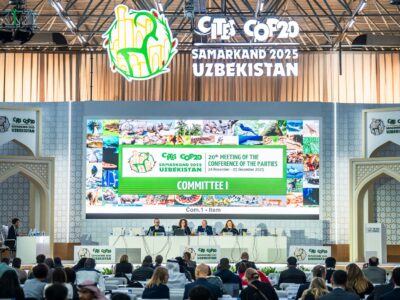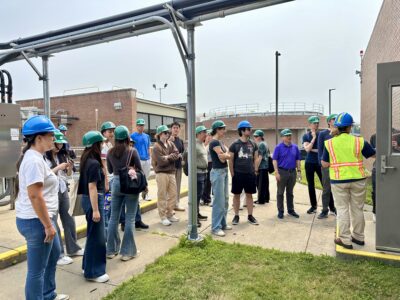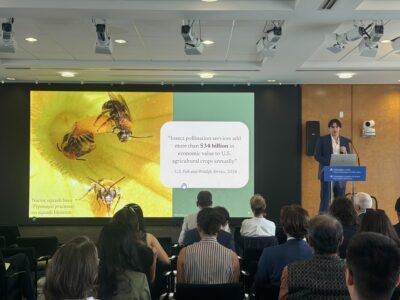
1. What drew you to the Master of Public Administration in Environmental Science and Policy program (MPA-ESP)?
I was drawn to the MPA-ESP program because of 3 reasons. First, it is a concise 1-year program that has a good balance of science, policy, and focus on sustainable development. Second, the program is part of the School of International and Public Affairs, one of the most internationally diverse public policy schools in the world, which provides tremendous opportunity for fledgling policy makers to add their unique voices to interact and discuss global issues. Third, the program is located in New York, providing us with easy access to global stakeholders at the international organizations like the United Nations.
2. What were you doing before you started the program?
I came to Columbia straight after completing my undergraduate program in chemical engineering and economics. Throughout my undergraduate education, I found myself constantly looking for courses and activities related to sustainable development to pursue. I have to credit my alma mater, the National University of Singapore (NUS), for being forward-looking in their program curriculum. For instance, while chemical engineers are often associated with oil refining and petroleum engineering (not very green, right?), NUS’ chemical engineering program offers electives on sustainable process development and environmental & health analysis, which helps engineers design refinery processes that are more environmentally benign. Through this, I discovered my interest in environmental and sustainable development issues.
3. What area of environmental policy and management are you most interested in?
I am most interested in water resource management, air pollution mitigation, and climate change policies as these are areas that presently and will continue to affect my home country, Singapore. I hope to contribute positively to their mitigation when I graduate from Columbia.
4. What skills and tools do you hope to acquire through the program?
I have learned how to harness the best outcome out of a diverse team of individuals. The quantity and intensity of group assignments and projects makes us great team players. Moreover, the way some semester-long projects are structured allow each member to take the leader at various points in time, building our leadership and management capabilities.
5. What is your favorite class in the MPA-ESP program so far, and why?
The best class I’ve taken so far has to be the Workshop in Applied Earth Systems Management. The class takes place in each of the 3 semesters and allows us to work in groups on real world sustainability issues. For instance, in the Summer and Fall, we took apart an environmental legislation in the US and drafted plans to implement the legislation. It was highly relevant to our future roles as environmental policy makers in both the public and private domain.
6. How has collaborating with your fellow students in class projects benefited you professionally and personally?
I have learned how to pick out the working styles and nuances of each of my team members. Professionally, this has enabled me to adapt my approach when working with different individuals to maximize our group productivity. Personally, I think it has made me a better friend.
7. Beyond the classroom, what, if any, extracurricular sustainability-related activities have you engaged in with your fellow Environmental Science and Policy students?
I am working with some course mates on a project to improve recycling and waste management habits in Columbia university. We intend to eventually implement small changes within Columbia and test their efficacy on recycling behavior. For now, we have been busy collecting baseline data on recycling behavior through waste audits. To date, we have conducted audits at 5 locations on campus. Apart from our project, I am serving as the Co-President for the ESP Student Government. My role is very exciting as it involves bringing ESP students closer to the general SIPA population.
8. How do you intend to utilize your degree from the MPA-ESP program to further your career?
I believe that the MPA-ESP degree, with its emphasis on team projects and policy analysis, will put me in good stead in my future role in the Singapore government as a policy officer.
****
Students in the MPA in Environmental Science and Policy program enroll in a year-long, 54-credit program offered at Columbia University’s School of International and Public Affairs, in partnership with the Earth Institute.
Since it began in 2002, the MPA in Environmental Science and Policy program has given students the hands-on experience, and the analytical and decision-making tools to implement effective environmental and sustainable management policies. The program’s 682 graduates have advanced to jobs in domestic and international environmental policy, working in government, private and non-profit sectors. Their work involves issues of sustainability, resource use and global change, in fields focused on air, water, climate, energy efficiency, food, agriculture, transportation and waste management. They work as consultants, advisers, project managers, program directors, policy analysts, teachers, researchers and environmental scientists and engineers.
Visit our website for more information: http://mpaenvironment.ei.columbia.edu/



